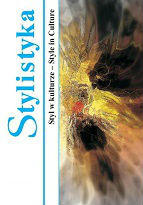МОВНО-ЕСТЕТИЧНИЙ КАНОН ПОЕЗІЇ ТАРАСА ШЕВЧЕНКА В УКРАЇНСЬКІЙ ЛІТЕРАТУРНІЙ МОВІ
The linguistic and aesthetic canon of Taras Shevchenko’s poetry in Ukrainian literary language
Author(s): Svitlana YermolenkoSubject(s): Language studies, Language and Literature Studies, Studies of Literature, Ukrainian Literature
Published by: Uniwersytet Opolski
Keywords: The linguistic and aesthetic canon of Shevchenko’s poetry; the criteria for literary norm; the depiction of society and everyday life; national and linguistic symbols; usage of folk and spoken express
Summary/Abstract: The article confirms that Taras Shevchenko is the creator and founder of the new Ukrainian literary language. His language use promoted the establishment and advancement of the literary norm in the word usage, word formation, the functioning of grammatical forms and syntax constructions, as well as in the word emphasis, in the fixed tone of the intonation in the Ukrainian language, etc. One of the criteria for literary norm is the influence of a recognized writer who establishes the aesthetic content of the literary norm. Shevchenko’s writings are marked by occasional use of alternative forms, lack of spelling consistency, and differences in word usage as compared to the modern literary standards. Despite this, the forms consistent with the literary standards prevail. The linguistic and aesthetic canons of Shevchenko’s writing were definitive in promoting stability and common usage of the literary norm. The linguistic and aesthetic canons of Shevchenko’s poetry combine specific sensory means of verbalized real and idealized life in dialogues and monologues of lyrical and narrative texts. The phenomenon of addressing a third party or self actualizes lexical, phraseological, and grammar units that convey an intimate relationship to everything arising inside a poet’s imagination, provoking thought, calling for self-expression. The aesthetic process encompasses the activities of a human life, the national history symbols, the beauty of nature, humans, means of expressing the dynamics of human feelings. The author’s thoughts and emotions influence the reader not only through the depiction of society and everyday life, the usage of national and linguistic symbols, or content common to all human beings, by also through frequent usage of objective structures and linguistic forms. The law of analogy provides that these forms are valuable in the context of symbolic, ideal literary norm. The linguistic and aesthetic canon of Shevchenko’s poetry expands the function of folk and spoken elements as sources for creating poetic forms within the stylistic paradigm of the modern Ukrainian language. The spoken emotional and expressive structures elevated by the high poetry diversify poetic expression and provide detailed images for abstract notions.
Journal: Stylistyka
- Issue Year: 2016
- Issue No: XXV
- Page Range: 499-512
- Page Count: 14
- Language: Ukrainian

